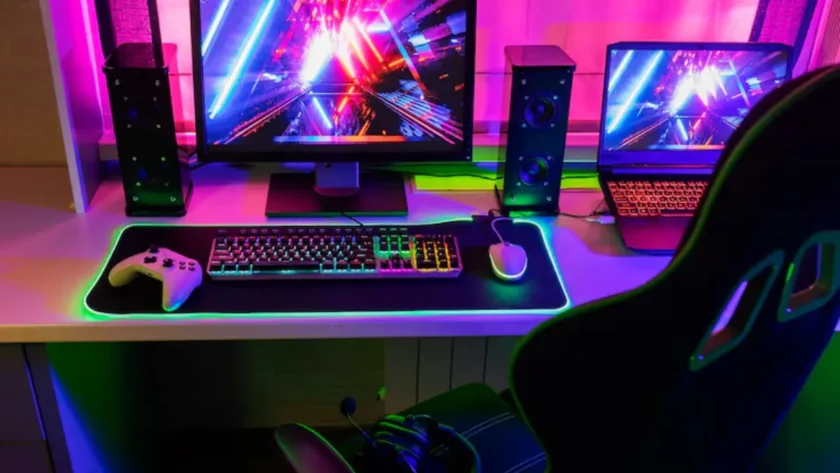The gaming world is continually evolving, offering thrilling experiences across various platforms. Gaming PCs stand out for their power, flexibility, and ability to deliver top-tier gaming experiences. When choosing a gaming PC, enthusiasts often decide between purchasing a prebuilt system or assembling a custom build.
Each choice comes with its unique set of advantages and considerations. This article provides a comprehensive guide to understanding the nuances between prebuilt and custom-built gaming PCs, enabling gamers to make educated decisions based on their preferences and gaming goals.
Contents
Prebuilt Gaming PCs
Prebuilt gaming PCs are popular among casual gamers and those seeking immediate access to gaming without the intricacies of assembling a system. These machines are fully assembled and configured by manufacturers or specialized retailers, allowing users to enjoy a plug-and-play experience.
A prebuilt gaming PC is crafted with well-matched components, ensuring optimal compatibility and performance right out of the box. The advantage of this option lies in its convenience and speed; gamers can jump into their favorite titles without delay.
Prebuilt PCs often come with the assurance of customer support and warranties. This is especially beneficial for individuals not comfortable troubleshooting potential technical issues independently. The systems are thoroughly tested before reaching consumers, providing confidence in their reliability and functionality. Prebuilt systems may limit customization, offering a fixed configuration that might not accommodate future upgrades as easily as custom-built PCs could offer.
Custom-Built Gaming PCs
A custom-built gaming PC represents the ultimate in personalization and performance optimization. The user designs and assembles it, allowing for precise control over each component’s selection and configuration.
Custom builds provide the flexibility to tailor a machine that aligns perfectly with the user’s gaming aspirations and aesthetic preferences. Enthusiasts often gravitate towards custom builds because they desire personalized functionality and the thrill of constructing a machine from scratch.
One of the primary advantages of custom builds is the ability to select state-of-the-art components that cater to specific gaming requirements. This level of customization ensures that resources are allocated for the desired performance, whether it be high-end graphics, fast processing speeds, or expanded storage solutions.
Although creating a custom build does require a certain degree of technical knowledge and patience, many gamers find the journey rewarding as they watch their dream gaming rig come to life. Moreover, a self-built system’s sense of ownership and pride adds an extra layer of satisfaction.
Performance Considerations
Performance is a pivotal factor in choosing between prebuilt and custom gaming PCs. Prebuilt systems are engineered to provide a balanced configuration tailored for smooth and reliable gaming experiences across various titles.
Manufacturers invest significant resources in ensuring that every component complements each other, minimizing bottlenecks and enhancing overall efficiency. This balanced approach allows gamers to enjoy stable performance over time, even if it may not offer the latest cutting-edge specifications.
Conversely, custom-built systems offer an opportunity to push performance boundaries beyond standard configurations. By handpicking each component, gamers can create a system that excels in specific aspects such as high-resolution gaming, virtual reality, or competitive e-sports.
Custom builds can also prioritize unique features or emerging technologies, enabling enthusiasts to achieve superior performance tailored to their gaming habits and preferences. The ability to overclock and independently adjust settings further extends the performance potential of custom-built systems, making them a go-to choice for competitive gamers seeking top-tier performance.
Cost Analysis
Cost efficiency is another critical consideration when selecting a gaming PC. Although convenient, prebuilt systems often come at a premium. This is due to additional factors like assembly costs, technical support, and the convenience of obtaining a ready-to-use machine. For gamers prioritizing minimal setup and seamless operation, these extra costs may be justified given the peace of mind and time saved.
Conversely, custom-built PCs can be more cost-effective if users strategically select components according to their gaming priorities. Users can allocate their budget toward key hardware elements directly impacting the gaming experience, ensuring better value for money.
Savvy shoppers can use sales and bundle deals to build a high-performance machine without exceeding their budget. While sourcing parts and assembling the system can be time-consuming, many hobbyists find that the potential cost savings and tailored performance make the effort worthwhile.
Upgradeability
Upgradeability is essential for gamers who wish to future-proof their systems against technological advancements. Prebuilt gaming PCs may present challenges due to proprietary designs limiting hardware replacements or expansions.
Additionally, space constraints within the case might restrict options for significant upgrades, such as larger graphics cards or more advanced cooling systems. Prospective buyers of prebuilt systems should assess the long-term potential for upgrades during the purchasing process.
Custom-built PCs, however, shine in upgradeability, providing a robust foundation for future enhancements. When building a custom PC, users can select a spacious and versatile case alongside a motherboard to support the latest technologies.
This foresight allows the easy incorporation of new components, such as additional RAM, new storage drives, or more powerful GPUs. The open architecture of custom builds ensures a longer lifecycle and the ability to adapt to evolving gaming needs without requiring a complete system overhaul.
User Experience
User experience encompasses many factors, including ease of setup, reliability, and personal satisfaction. Prebuilt gaming PCs offer unparalleled convenience, taking the complexity out of the setup. Users receive a fully assembled machine with the operating system pre-installed, allowing them to dive into gaming with minimal effort. The availability of manufacturer warranties and technical support further enhances peace of mind, particularly for users who prefer focusing on gaming rather than tech challenges.
Conversely, custom building a gaming PC does demand a higher level of involvement and technical acumen. From researching compatible components to physically assembling the system, the process may seem daunting to newcomers. However, this endeavor allows users to craft a unique setup that reflects their personality and gaming style.
The experience of building a custom PC fosters a deeper connection between the gamer and their machine, with the knowledge gained contributing to lifelong skills in computer assembly and troubleshooting. Many enthusiasts find the added intricacies an appealing aspect of the hobby, rewarding them with a personalized and hands-on gaming experience.
Conclusion
Choosing between prebuilt and custom-built gaming PCs is a decision deeply influenced by individual preferences, priorities, and gaming goals. Prebuilt systems excel in providing ready-to-use performance, convenience, and reliability, all essential for gamers eager to jump immediately into action.
Meanwhile, custom builds offer a tailored experience, with the flexibility to prioritize components for specific performance needs and constantly update and adjust to the latest advancements. By carefully evaluating these categories regarding cost, performance, upgradeability, and user experience, each gamer can uncover the ideal setup that enhances their gaming adventures and aligns with their aspirations.




